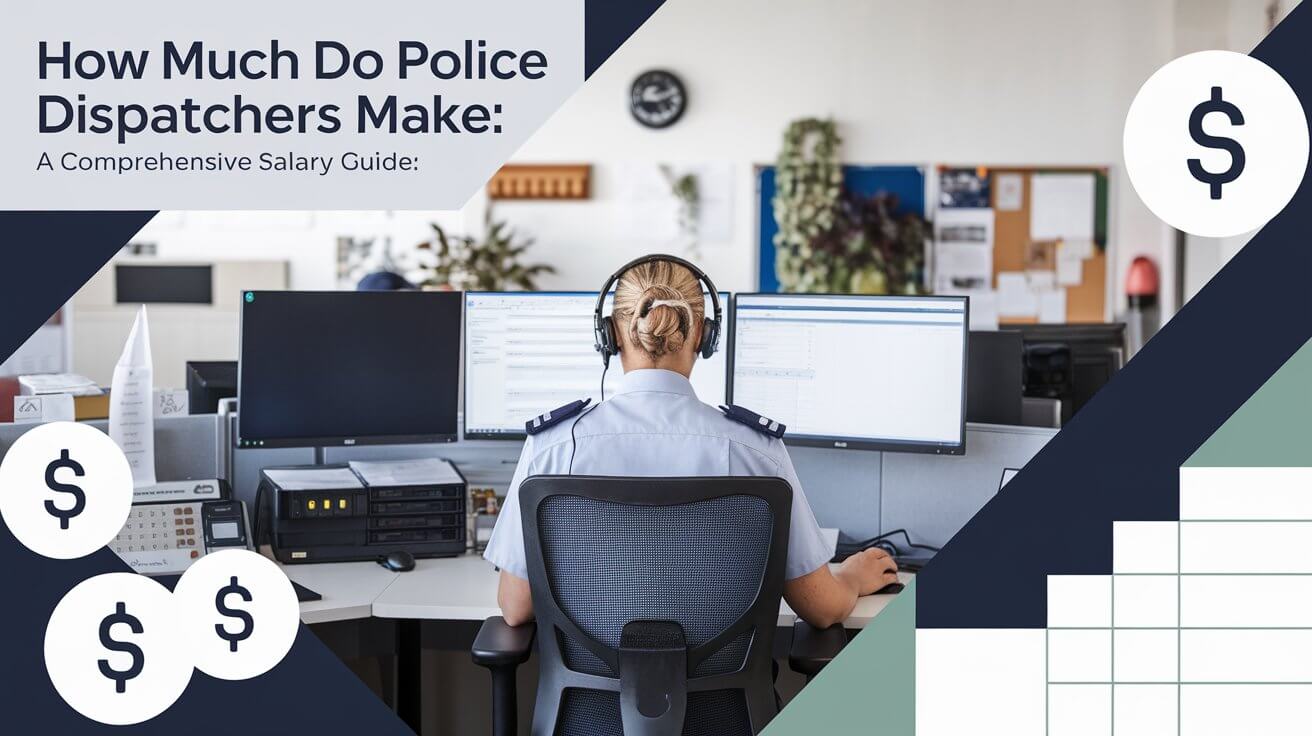How Much Do Police Dispatchers Make: A Comprehensive Salary Guide

Police dispatchers play a crucial role in emergency response systems across the United States. If you’re considering this career path or simply curious about the profession, you might be wondering: how much do police dispatchers make? The average salary for police dispatchers in the U.S. is $64,459 per year, or about $30.99 per hour. However, this figure can vary widely based on several factors.
In this guide, we’ll explore the ins and outs of police dispatcher salaries. We’ll look at pay rates across different states, cities, and regions. We’ll also dive into how experience, education, and location can affect your earnings. By the end, you’ll have a clear picture of what to expect in this rewarding career.
The Role of a Police Dispatcher
Before we jump into the numbers, let’s quickly recap what police dispatchers do. These professionals are the first point of contact in emergency situations. They answer 911 calls, gather crucial information, and coordinate with police officers, firefighters, and paramedics.
Police dispatchers need to stay calm under pressure, think quickly, and communicate clearly. They use complex computer systems and must be familiar with emergency protocols. It’s a demanding job that requires specific skills and training.
Factors Influencing Police Dispatcher Pay
Several key factors can affect how much a police dispatcher makes:
- Location
- Experience
- Education and certifications
- Size of the jurisdiction
- Cost of living in the area
Let’s explore each of these in more detail.
National Average Salary for Police Dispatchers
As mentioned earlier, the national average salary for police dispatchers is $64,459 per year. But what does this look like in terms of hourly wages? And how does pay differ between entry-level and experienced dispatchers?
Hourly Wages vs. Annual Salaries
Most police dispatchers are paid hourly. The average hourly wage is $30.99. This translates to about $1,239 per week or $5,371 per month.
Keep in mind that these figures are averages. Some dispatchers earn more, while others earn less. The salary range for police dispatchers typically falls between $52,000 and $74,000 per year.
Entry-Level vs. Experienced Dispatcher Pay
As with most professions, experience plays a big role in determining pay. Entry-level dispatchers usually start at the lower end of the pay scale. With time and experience, they can move up to higher-paying positions.
Here’s a rough breakdown:
- Entry-level (0-2 years): $27,500 – $52,000 per year
- Mid-career (3-7 years): $52,000 – $74,000 per year
- Experienced (8+ years): $74,000 – $101,500 per year
Remember, these ranges can vary based on location and other factors.
Top-Paying States for Police Dispatchers
Where you work can significantly impact your earnings as a police dispatcher. Some states offer higher average salaries than others. Here are the top five states for police dispatcher salaries:
- Alaska: $32.97 per hour
- California: $29.30 per hour
- Washington: $26.10 per hour
- Colorado: $22.44 per hour
- New York: $22.60 per hour
Highest-Paying Cities Within These States
Even within high-paying states, some cities offer better salaries than others. Here are some top-paying cities for police dispatchers:
- San Jose, CA: $37.26 per hour
- Oakland, CA: $41.84 per hour
- Anchorage, AK: $35.84 per hour
- Seattle, WA: $23.10 per hour
- New York City, NY: $24.36 per hour
Cost of Living Considerations
While these salaries might look impressive, it’s important to consider the cost of living in these areas. Cities like San Jose and New York have high living costs, which can offset the higher salaries.
Police Dispatcher Salaries by Region
Let’s break down dispatcher salaries by region to get a clearer picture of pay across the country.
Northeast Salary Trends
In the Northeast, police dispatcher salaries tend to be higher than the national average. States like New York, Massachusetts, and Maryland offer competitive pay.
- New York: $22.60 per hour
- Massachusetts: $20.00 per hour
- Maryland: $21.89 per hour
Midwest Salary Trends
Midwest salaries often align closely with the national average. Here are some examples:
- Illinois: $21.51 per hour
- Ohio: Data not available, but it’s one of the top 5 states for dispatcher employment
South Salary Trends
Southern states generally offer lower salaries compared to the national average, but the cost of living is often lower too.
- Texas: $18.32 per hour
- Florida: Data not available, but it’s in the top 5 for dispatcher employment
West Salary Trends
Western states, particularly on the coast, tend to offer higher-than-average salaries:
- California: $29.30 per hour
- Washington: $26.10 per hour
- Arizona: $20.12 per hour
Salary Comparison: Urban vs. Rural Dispatchers
Location doesn’t just matter at the state level. There’s often a significant difference between urban and rural dispatcher salaries.
Metropolitan Area Salaries
Metropolitan areas typically offer higher salaries due to higher living costs and larger populations. For example:
- San Francisco, CA: $25.34 per hour
- New York City, NY: $24.36 per hour
- Chicago, IL: $22.52 per hour
Small Town and Rural Salaries
Rural areas generally offer lower salaries, but the cost of living is usually lower too. For instance:
- Galveston, TX: $19.19 per hour
- Amarillo, TX: $18.77 per hour
While these salaries are lower than in big cities, they might provide a similar or better standard of living due to lower expenses.
Education and Training Impact on Dispatcher Salaries
Your education and training can significantly affect your earning potential as a police dispatcher.
Required Qualifications
Most dispatcher positions require at least a high school diploma or GED. Some agencies prefer candidates with some college education, particularly in criminal justice or a related field.
Advanced Certifications and Pay Increases
Obtaining additional certifications can boost your salary. Some valuable certifications include:
- Emergency Medical Dispatcher (EMD)
- Emergency Fire Dispatcher (EFD)
- Emergency Police Dispatcher (EPD)
These certifications can lead to pay increases of 5-10% or more.
Experience and Career Progression
As we touched on earlier, experience plays a crucial role in a dispatcher’s salary. Let’s look at this in more detail.
Entry-Level Salaries
New dispatchers typically start at the lower end of the pay scale. Entry-level salaries often range from $27,500 to $52,000 per year.
Mid-Career Earnings
With 3-7 years of experience, dispatchers can expect to earn between $52,000 and $74,000 annually.
Senior Dispatcher Compensation
Experienced dispatchers with 8 or more years on the job can earn $74,000 to $101,500 per year, sometimes even more in high-paying areas.
Benefits and Perks for Police Dispatchers
Salary is just one part of the compensation package for police dispatchers. Many agencies offer attractive benefits that add significant value to the overall package.
Health Insurance and Retirement Plans
Most full-time dispatchers receive comprehensive health insurance coverage. Many agencies also offer retirement plans, such as pensions or 401(k) programs.
Overtime and Shift Differential Pay
Dispatchers often have opportunities for overtime pay. Many agencies also offer shift differential pay for working nights, weekends, or holidays. This can significantly boost a dispatcher’s total compensation.
Salary Trends and Future Outlook
Understanding salary trends can help you make informed career decisions.
Historical Salary Data
Over the past decade, dispatcher salaries have generally trended upward, keeping pace with inflation and sometimes exceeding it.
Projected Growth in Dispatcher Salaries
The Bureau of Labor Statistics projects a 6% growth in dispatcher jobs from 2021 to 2031, which is about as fast as the average for all occupations. This steady demand could lead to continued salary growth.
Comparing Police Dispatcher Salaries to Similar Professions
How do police dispatcher salaries stack up against similar roles? Let’s compare.
911 Operators
911 operators often have similar duties to police dispatchers and their salaries are comparable. The national average for 911 operators is slightly lower, at around $44,000 per year.
Emergency Medical Dispatchers
Emergency Medical Dispatchers (EMDs) focus specifically on medical emergencies. Their average salary is close to that of police dispatchers, at about $40,000 to $60,000 per year.
How to Maximize Earnings as a Police Dispatcher
If you’re looking to boost your earnings as a police dispatcher, consider these strategies:
Negotiating Your Salary
Don’t be afraid to negotiate your salary, especially if you have experience or specialized skills. Research typical salaries in your area to support your case.
Advancing Your Career
Look for opportunities to take on additional responsibilities or leadership roles. Pursuing advanced certifications or further education can also lead to higher pay.
Conclusion: Understanding Police Dispatcher Compensation
Police dispatchers play a vital role in public safety, and their compensation reflects this importance. While the national average salary is $64,459 per year, actual earnings can vary widely based on location, experience, and other factors.
From the bustling streets of New York City to the quiet towns of rural Texas, dispatcher salaries reflect local economic conditions and cost of living. Education, certifications, and experience can all boost your earning potential.
Remember, salary is just one part of the picture. Benefits, job security, and the satisfaction of helping others are all important factors to consider in this rewarding career.
Whether you’re considering becoming a police dispatcher or looking to advance in the field, understanding these salary trends can help you make informed decisions about your career path.






